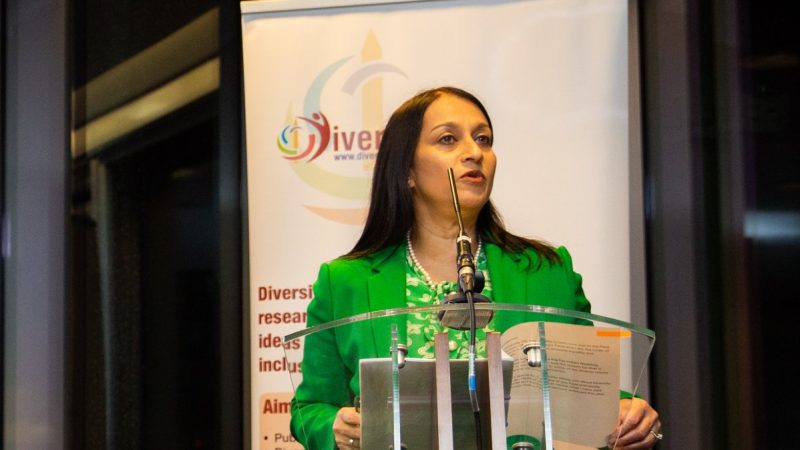BAME economists are under-represented in UK Universities

Ethnic minorities form a growing proportion of UK academic economists, though some remain heavily under-represented in the most prestigious institutions, according to a new study by the Institute of Fiscal Studies (IFS).
Among economists in UK universities, nearly a quarter (24 per cent) doing research are from non-White backgrounds, an increase of 5 percentage points since 2012. This is higher than academia overall and the general population. Reflecting a broader pattern in UK academia, Chinese and Indian ethnicity individuals are overrepresented, while Black individuals are underrepresented.
Ethnic diversity among economists matters particularly because economists play an important role in the formulation of policy. Diversity within the profession has wider implications for society.
New research published by IFS, co-funded by the Royal Economics Society and the Economic and Social Research Council through the CPP Research Centre at IFS, highlights inequalities between ethnic groups in UK university economics departments. A lack of data from outside of universities means providing a broader survey of the profession is not currently possible.
- There are clear differences in the type of roles held by ethnic minority staff compared to White staff – as is the case across much of UK academia. Black economists are 64 per cent less likely to work in Russell Group institutions than White ones and ethnic minority economists are less likely to hold senior academic or managerial positions.
- Among undergraduate students, economics is a relatively popular field of study among ethnic minorities, with non-white students accounting for 37 per cent of British undergraduates in 2018. In fact, it is among White students – and White women in particular – where take-up of economics is lowest. However, ethnic minority students are much less likely to continue into further study.
The research also highlights a number of other differences in experience between different ethnic minority groups:
- As with research staff, some ethnic minority groups are less likely to study economics in Russell Group universities. Bangladeshi undergraduates are half as likely as White students to do so; Black Caribbeans are more than 60 per cent less likely.
- The presence of potential role models from similar backgrounds as students varies, with Pakistanis and Black Caribbeans underrepresented among those teaching economics.
- There are persistent and growing attainment gaps for economics students from minority ethnic backgrounds compared to White students. Black Caribbean students were 24 percentage points less likely to get a first-class degree in 2018, and such gaps cannot be explained by characteristics like institution attended or prior attainment.
- Data from the Government Economic Service (GES) made available by them for this research, highlights differential success in the recruitment process of one significant employer of economists and suggests another important obstacle after university. In 2018, 22% of White applicants who passed the initial assessment through the Fast Stream were successful; 8% of non-White applicants were.
Ross Warwick, a Research Economist at the IFS, said:
“Ethnic diversity among economists matters particularly because economists often play an important role in the formulation of policy. Overall academic economists in the UK are relatively ethnically diverse compared to other fields and the population as a whole. However, some groups remain underrepresented, such as Pakistanis, Bangladeshis and Black Caribbeans, reflecting a broader pattern across the academic sector. Those from many ethnic minorities are also relatively unlikely to work at Russell Group universities.”
Arun Advani, Assistant Professor at the University of Warwick and co-chair of the Discover Economics campaign, said:
“Our research shows that ethnic minority students are more likely than White students to study economics at the undergraduate level. However, they are less likely to study at Russell Group universities, to get top degrees, or to go on to further study. Further research is required to better understand the causes of these differences ”
Carol Propper, President of the Royal Economics Society, said
“The Royal Economic Society is committed to improving diversity in UK economics. This enquiry into the state of economics in Universities is part of our current actions to achieve this end”.
Key findings
1. Ethnic diversity among academic economists is increasing over time. The share of (non-White) ethnic minority academic economists doing research and teaching has increased from 19% in 2012–13 to 24% in 2018–19. This is higher than in UK academia generally (17% in 2018–19) and in the UK population (13% among individuals aged 25–64 as of 2011).
2. However, there are large differences in representation across different ethnic groups. Individuals of Chinese and Indian ethnicity are heavily over-represented, while Black individuals are under-represented relative to their share of the UK population. This reflects a broader pattern within the academic sector in the UK.
3. These differences are even larger when focusing on the most research-intensive (Russell Group) universities, again mirroring a pattern across academia more generally. While 50% of White academic economists work in Russell Group universities, less than 30% of Pakistani and Bangladeshi academic economists do so, and less than 20% of Black academic economists do so. Ethnic minority economists who do work in Russell Group universities are 45% less likely to hold a professorial or managerial level job, compared with their White counterparts.
4. Ethnic diversity among economics students is greater than other Social Sciences and STEM fields, and is increasing: since 2012, the share of non-White students among British economics undergraduates has increased by 4 percentage points.
5. Among current undergraduates, around 20–25% of students with an economics A Level study economics depending on ethnicity, compared with 0.6–1.5% of those without A Level economics. Differential take-up at A Level is a key factor in the economics pipeline.
6. Ethnic minority students are less likely to study at Russell Group universities. While nearly 50% of White students study in Russell Group universities, less than 20% of Black students (and less than 25% of Pakistani and Bangladeshi students) do so, again paralleling patterns for staff. This creates an additional barrier to progression into academia.
7. There are large and persistent ‘attainment gaps’ between White and ethnic minority economics students: ethnic minority students are 7 percentage points less likely to get at least an upper second class honours degree and 11 percentage points less likely to get a first class honours degree. These gaps are wider than in 2012–13.
8. Looking at the student experience in searching for jobs, Government Economic Service recruitment data show that at every stage of the application process, ethnic minority applicants are less likely to be successful. In 2018, of those who passed the initial online test for the Fast Stream programme, only 8% of ethnic minority candidates ended up receiving a job offer, compared with 22% of White candidates.
9. Progress in tackling the barriers faced by ethnic minority individuals who are considering a career in economics requires a better understanding of what those barriers are. Further quantitative approaches to understanding barriers to progress are limited by a lack of data: in many cases, these data are not being collected, and where collected they are not analysed or made available for analysis.
Click here to download a copy of the IFS Ethnic diversity in UK economics report




